SCHIZOPHRENIA
#mentalhealth #schizophrenia #science #stopmotion
Chapters
0:00-0:45 Introduction to schizophrenia
0:45-1:33 The crucial history of schizo...
1:33- 2:19 How does one develop the disease?
2:19-3:34 How is it diagnosed?
3:34-4:44 The symptoms of schizophrenia
4:44- 6:05 Parts of the Brain that schizophrenia affects
6:05-7:25 How to manage schizophrenia
7:25-7:35 Thankyou for watching
7:35-8:47 Bloopers**funny
Transcript (not fully accurate)
Introduction
Schizophrenia, one of the most misunderstood yet fairly common mental health disorders in our modern era, with over 1% of people with the condition.
When people hear schizophrenia they think (Ask your friends: insert audio recording of friend and stick man talking with speech bubble)
The issue with this strain of thought is that it leads nowhere in both understanding the disease, and cooperating individuals with schizophrenia in our society.
In this video we will not only learn about the condition and its history, but we will also rewire our brains to be free of any misconceptions that you, that’s right you may have about the disease.
The history of schizophrenia
Schizophrenia was discovered by Dr Emile Kreapelin in the year 1887.
However, the disease is believed to have been with mankind long before that
In fact the oldest recorded description of an illness like schizophrenia dates back to the Ebers Papyrus of 1550BC from Egypt.
The word schizophrenia was coined by Eugen Bleuler. A swedish psychiatrist and humanist , most notable for naming schizophrenia, autism and schizoid.
How schizophrenia is developed.
So with all this important history the question arises of how one get’s schizophrenia.
For starters SChizophrenia is not an infectious disease like malaria or AIDS, therefore how one gets it is far more complex and interesting.
Nature vs Nurture
The odds of an individual developing Schizophrenia is heightened when the disease is prevalent in one’s blood line.
At the same time the prevalence of the disease schizophrenia increases when an infection or damage occurs to a fetus's brain before birth.
Say person A was born with 2 parents with schizophrenia, then their likelihood of developing the condition is 40%.
How is the disease/disorder diagnosed? It is usually diagnosed when people have an onset of psychosis, by a medical professional (Psychiatrist) in a proper setting (hospital).
Two of the following
Delusions: “The CIA has planted a bomb inmy brain and you are a part of them”
Hallucinations
Disorganized speech
Disorganized/catatonic behavior
Negative symptoms
Cognitive symptoms (not needed for diagnosis)
Ongoing for 6 months : prodromal, active = 1 month, residual
Not another condition ie. Drug abuse
How does it affect the brain? (do this part in video)
Negative symptoms and Positive symptoms exist for schizophrenia.
Negative symptoms (Qualities that are reduced in people with schizophrenia): Motivation, expression of emotion, Flat affect (inappropriate response), Alogia (poverty of speech), Avolution(Lack of motivation)
Cognitive symptoms: Difficulty concentrating, remembering information, and making decisions.
Positive symptoms (symptoms that occur with people that have schizophrenia but not in the general population): Disordered speech,
hallucinations and behavior
How is this disease managed?
Medicinal approaches: Therapy (cognitive behavioral therapy), psychopharmacology, medicine (Haldol,Loxitane,Navane )
Electroconvulsive therapy: Electrodes attached to temples (shock therapy). Done to improve mood.
Exercise, sleep and nutrition are cornerstones of maintaining wellness in individuals with schizophrenia.
. *There are side effects. (Neg symptoms increase at times)
Usually requires lifelong treatment.
-
 5:23
5:23
Adonimes
10 months agoSchizophrenia
11 -
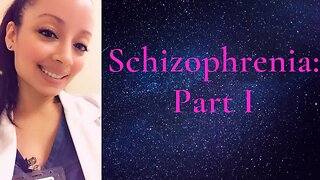 27:25
27:25
BrigitteNP
5 years agoSchizophrenia: Part I
3 -
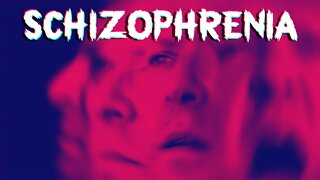 15:55
15:55
Atomic Shaman Sweatlodge
1 year agoSchizophrenia
2 -
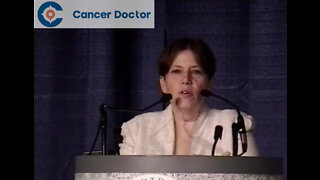 32:17
32:17
cancerdoctor
1 year agoSchizophrenia
33 -
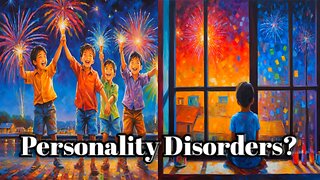 3:29
3:29
Psychereveals
2 months agoSchizoid personality disorder
42 -
 1:57:42
1:57:42
Strange TV
1 year agoSatanic Psychiatry & Demonic Schizophrenia
255 -
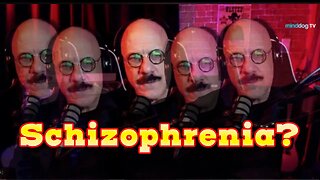 2:43
2:43
minddogTV
1 year agoPsychic or Scizophrenia?
8 -
 44:28
44:28
New Beginnings Addiction Recovery Ministry
3 years agoMental Health : Schizophrenia
49 -
 1:04:54
1:04:54
expandedmindspodcast
1 year agoSpiritual Emergency or Psychosis (w/ bipolarorwakingup ) Podcast 05
48 -
 24:15
24:15
BrigitteNP
4 years agoSchizophrenia: Part II
1